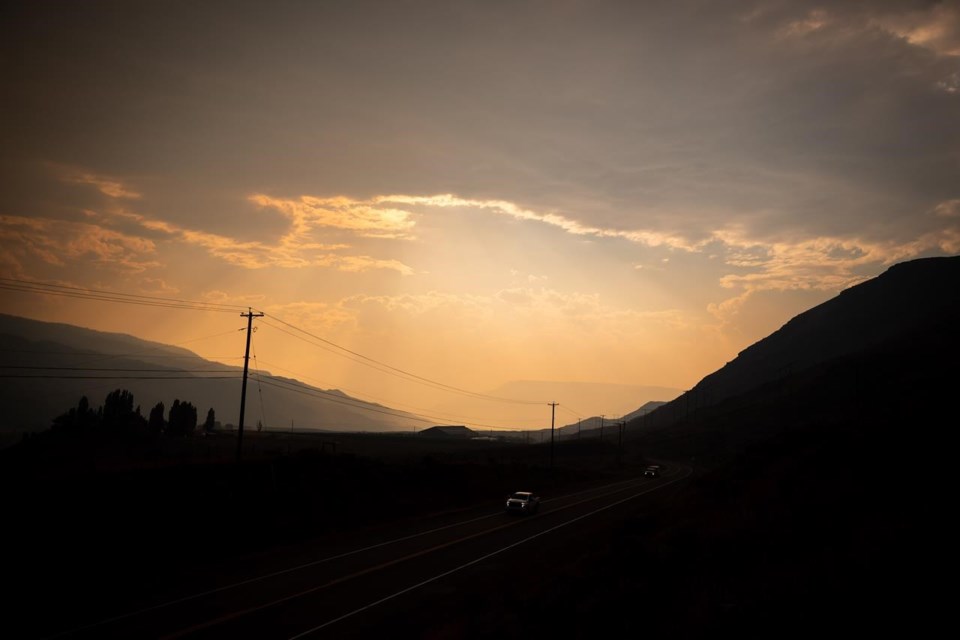VERNON, B.C. — Showers brought some relief and stalled significant growth this weekend at a wildfire that's forced thousands out of their homes in British Columbia's southern Interior, though hot and dry conditions are expected to return starting Monday.
Forrest Tower, fire information officer with the BC Wildfire Service, said the weather has given crews a window of opportunity to attack and build guards around parts of the White Rock Lake fire burning between Kamloops and Okanagan Lake.
The most fire activity has been along the northeastern perimeter stretching south from the recreational community of Monte Lake to the western banks of Okanagan Lake, Tower told a briefing hosted by the Thompson-Nicola Regional District.
The southeastern flank is also a priority for firefighting and structure protection personnel as the fire encroaches on properties around Westside Road, he said.
Up to 2.5 millimetres of rain were enough to quell the fire's growth for a few days, he said, but hot weather is likely to create conditions for aggressive fire behaviour later this week. Environment Canada is calling for daytime highs of 35 Celsius or higher in Kamloops starting Thursday, with no precipitation in the seven-day forecast.
The eastern flank of the fire that's measured at 557 square kilometres is highly visible to surrounding communities, the wildfire service says, and in some areas it's burning just 100 to 250 metres from the western banks of Okanagan Lake.
The service has boosted the number of wildland firefighters battling the blaze to 155, up from 126 on Saturday, with some remaining on-site overnight.
The City of Vernon rescinded an evacuation alert for most of its roughly 45,000 residents on Saturday, saying the probability of ember debris causing spot fires was reduced, but "the region remains at high risk" and the situation could change rapidly.
One of the main concerns when the wildfire service recommended that Vernon issue an alert was that embers could jump across Okanagan Lake, said Tower.
"Luckily, we were able to get a break in the weather and that didn't happen, but this fire is showing very, very extreme fire behaviour and so ... we are expecting, at some point, to be returning to conditions that will lead to that significant fire behaviour."
An evacuation alert is still in place for about 700 residents of more than 500 properties in neighbourhoods closer to the eastern banks of Okanagan Lake.
Kamloops has rescinded an evacuation alert for several neighbourhoods on the city's outskirts, saying the fire no longer poses an imminent risk to residents' safety.
A map from the Thompson-Nicola Regional District shows orders and alerts stretching from the intersection of the Trans-Canada Highway and now-closed Highway 97 east of Kamloops to Chase in the north and Armstrong in the east.
Elsewhere in B.C., the wildfire service says there hasn't been significant growth at the 771-square kilometreSparks Lake wildfire north of Kamloops Lake and some people have been allowed to return home as evacuation orders were downgraded.
The 306-square kilometre Tremont Creek fire southeast of Ashcroft is burning at a slow rate down the slope of Mt. Savona in Tunkwa Provincial Park, the service says, while crews are building guards and conducting planned ignitions when possible.
About 280 wildfires are currently burning across B.C. out of a total 1,432 fires sparked since April 1, scorching close to 6,400 square kilometres. Thirty-one active blazes are considered either highly visible or pose a potential threat to public safety.
Seventy-one evacuation orders in response to wildfires covered more than 6,900 properties across B.C. as of the province's last update, an increase of more than 1,200, while residents of 35,700 properties must be ready to leave on short notice.
This report by The Canadian Press was first published Aug. 8, 2021.
— by Brenna Owen in Vancouver
This story was produced with the financial assistance of the Facebook and Canadian Press News Fellowship.
The Canadian Press



